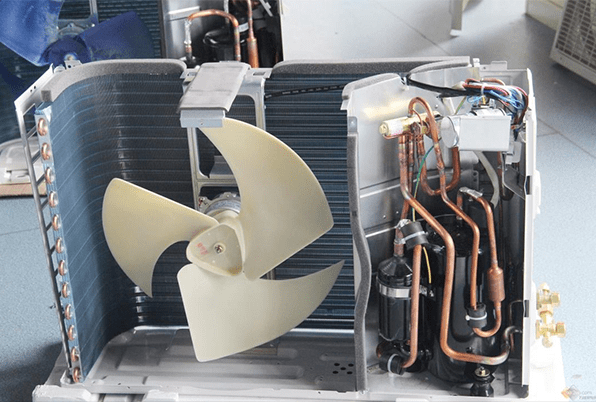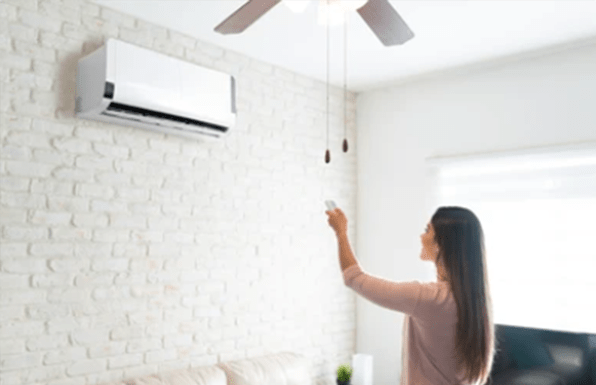
Figure 1: Split HVAC system unit.
If you're looking for an efficient and flexible heating and cooling solution for your home, a ductless heat pump may be just what you need. Also known as a mini-split system, a ductless heat pump can provide both heating and cooling to your home without the need for ductwork.
In this article, we'll explore how a ductless heat pump works, its benefits, and its installation and maintenance requirements.
1. What is a Ductless Heat Pump?
A ductless heat pump is a type of HVAC system that consists of an outdoor unit and one or more indoor units. The outdoor unit contains a compressor, a heat exchanger and a fan, while each indoor unit has a heat exchanger and a blower. These components work together to transfer heat from one area to another, either heating or cooling the air as needed.
Unlike traditional heating and cooling systems that use ductwork to distribute air throughout your home, a ductless heat pump delivers conditioned air directly into each room through a small, unobtrusive unit mounted on the wall or ceiling.

Figure 2: Ductless heat pump unit.
2. How Does a Ductless Heat Pump Work?
A ductless heat pump works by using refrigerant to transfer heat from one area to another. In heating mode, the outdoor unit absorbs heat from the outside air and transfers it to the indoor unit via refrigerant lines. The indoor unit then blows warm air into the room. In cooling mode, the process is reversed, with the outdoor unit absorbing heat from the indoor air and transferring it outside.
The indoor units of a ductless heat pump can be controlled individually, allowing for zoned temperature control. This means that each room or zone can have its own temperature setting, increasing energy efficiency and comfort.

Figure 3: Ductless heat pump system.
3. Benefits of Ductless Heat Pumps
Energy Efficiency: Ductless heat pumps are highly energy-efficient, using up to 50% less energy than traditional heating and cooling systems. This can result in significant cost savings on monthly energy bills.
Zoning Capabilities: As mentioned earlier, ductless heat pumps offer zoning capabilities, allowing for individual temperature control in each room or zone. This increases comfort and energy efficiency.
Improved Indoor Air Quality: Ductless heat pumps also improve indoor air quality by reducing the amount of dust, allergens, and other particles in the air. This is because they do not rely on ductwork to distribute air throughout the home, which can accumulate dirt and debris over time.
Quiet Operation: Ductless heat pumps operate quietly, making them a good choice for bedrooms, living rooms, and other areas where noise levels are important.

Figure 4: The inner structure of the heat pump outdoor unit.
4. Drawbacks of Ductless Heat Pumps
Upfront Costs: Ductless heat pumps require an upfront investment, as they are typically more expensive than traditional heating and cooling systems. However, the long-term energy savings can offset this cost over time.
Aesthetics: Some homeowners may not like the look of the indoor units, which are mounted on the wall or ceiling. However, there are options available that blend in with the decor, such as units with wood-grain finishes.
Regular Maintenance: Like all HVAC systems, ductless heat pumps require regular maintenance to ensure optimal performance and longevity. This includes cleaning or replacing filters, checking refrigerant levels, and inspecting components for wear and tear.
5. Installation and Maintenance of Ductless Heat Pumps
Installation of a ductless heat pump typically involves several steps, including the installation of the outdoor unit, the indoor units, and the refrigerant lines that connect them. It is important to have a professional HVAC contractor handle the installation to ensure that everything is done correctly and safely.
Once the system is installed, regular maintenance is important to keep it running smoothly and efficiently. This includes tasks such as cleaning the filters and coils, checking the refrigerant levels, and inspecting the system for any signs of wear or damage. It is recommended to have a professional perform an annual maintenance check to ensure that the system is operating at peak efficiency.

Figure 5: Ductless heat pump indoor unit installation.
6. What to Consider When Choosing a Ductless Heat Pump
Size: It's important to choose a ductless heat pump that is the right size for your home or space. An HVAC contractor can perform a load calculation to determine the appropriate size unit based on factors such as square footage, insulation, and climate.
Efficiency Rating: Look for a ductless heat pump with a high efficiency rating, such as ENERGY STAR certification. This can result in significant energy savings over time.
Zoning Capability: Consider how many zones or rooms you want to control individually, and choose a system that meets those needs.
Brand and Warranty: Research different brands and read reviews to find a reputable manufacturer. Also, look for a system with a solid warranty to protect your investment.
7. FAQs
7.1 What are the Disadvantages of a Mini Split Heat Pump?
One disadvantage of a mini split heat pump is that it can be expensive to install compared to other heating and cooling systems. Mini splits require professional installation and specialized equipment, which can increase the upfront cost.
Additionally, if not properly sized and installed, a mini split heat pump may not be able to adequately heat or cool a space, leading to discomfort and inefficiency.
Finally, mini splits may not be the best option for very large or complex spaces, where a central HVAC system may be more effective.

Figure 6: Ductless heat pump indoor unit.
7.2 Can a Ductless Heat Pump Heat a Whole House?
Yes, a ductless heat pump can heat a whole house, but the effectiveness depends on various factors such as the size of the house, insulation, and outdoor temperature.
A properly sized and installed ductless heat pump can provide efficient heating throughout the house. However, if the house is too large or has multiple levels, multiple indoor units may be required to maintain consistent heating.
Additionally, insulation and air sealing play a crucial role in retaining heat and improving the efficiency of the system. It is important to consult with a professional to determine if a ductless heat pump is a suitable option for your specific home heating needs.
7.3 Do Ductless Heat Pumps Use a lot of Electricity?
Ductless heat pumps are generally considered to be an energy-efficient heating and cooling system. They use electricity to operate, but they are much more efficient than traditional heating systems that burn fossil fuels.
The amount of electricity a ductless heat pump uses depends on several factors such as the size of the unit, the efficiency of the system, and how often it is used.
However, because ductless heat pumps transfer heat rather than generate it, they can provide up to 4 times more heating output for every unit of electricity consumed, resulting in lower energy bills compared to other heating systems.

Figure 7: Use a remote control to control the indoor unit of the heat pump.
7.4 What are the Disadvantages of Ductless Air Conditioning?
One disadvantage of ductless air conditioning is that it can be more expensive to install than traditional central air conditioning systems. Ductless systems require professional installation and specialized equipment, which can increase the upfront cost.
Additionally, the indoor units of ductless systems can be visible and may not be aesthetically pleasing for some homeowners. Another potential disadvantage is that ductless systems may not be the best option for very large or complex spaces, where a central HVAC system may be more effective.
Finally, as with any air conditioning system, ductless systems require regular maintenance to ensure optimal performance and efficiency.
Related Info
Ducted Heat Pumps: Everything You Need to KnowHow Do I Know If I Have a Heat Pump or an AC? A Comprehensive Guide
Heat Pump Not Turning On: Troubleshooting Guide
Heat Pump vs Central Air: Which One is Right for You?
Heat Pump vs Conventional HVAC: Which is Better for Your Home?


